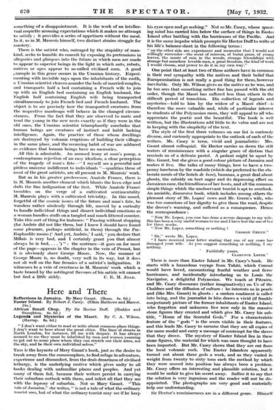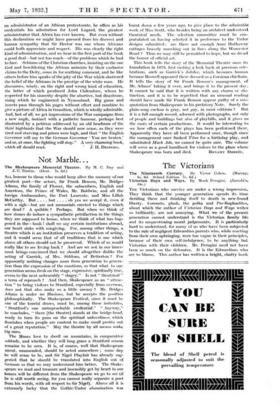Here and There
Legends and Mysteries of the Maori. By C. A. Wilson. (Harrap. 8s. 6d.) " I don't want either to read or write aboUt common-place things. I don't want to hear about the great cities. The lines of streets in North London, for instance, fill me with despair. It has always seemed to me they must be inhabited by men and women' yearning to get out to some place where they can stretch out their arms, see the sky, and be their own individual selves."
Tars is the keynote of Mary Gaunt's book, just as the desire to break away from the commonplace, to find refuge in adventure, experience and discomfort, from the drab dreariness of civilised lethargy, is the underlying motive which gives unity to all books dealing with unfamiliar places and peoples. And yet many of them fail, because their writers persist in carrying their suburban outlook with them, and infect all that they see with the leprosy of suburbia. Not so Mary Gaunt. "This tale of Jamaica," she writes, " is not a tale of what the ordinary tourist sees, but of what the ordinary tourist may see if he keep
his eyes open amigo seeking." Not so Mr. Casey, whose quest- ing mind has carried him below the surface of things in Easter Island after battling with the hurricanes of the Pacific. And it is the same impulse which prompts Sir Hector Duff to write of his life's balance-sheet in the following terms :
" on the other side are experiences and memories that I would not willingly surrender—the scent of mimosa, of burnt grass, of young leaves, the music of rain in the woods, strange friendships with strange but somehow lovable men, a great freedom, the kind of work I would choose, and power to do it in my own way."
One point that at least two of these authors have in common is their real sympathy with the natives and their belief that Europeanisation is not really a good thing for them, however inevitable. Only Mr. Wilson gives us the native as he was, and he too sees that something rather fine has passed with the old order, though the Maori has suffered less than others in the difficult period of transition. His collection of legends and mysteries—told to him by the widow of a Maori chief—is therefore the more valuable and, while of particular interest to students of the Polynesian races, they will appeal to all who appreciate the poetic and the beautiful. The book is well written, but the illustrations add little to its value and are not in keeping with the simplicity of the text.
The style of the first three volumes on our list is curiously diverse, and curiously appropriate to the outlook of each of the writers. Mr. Casey is terse, vivid and journalistic: Mrs. Gaunt almost colloquial. Sir Hector carries us down the still waters of reminiscence with a singular grace of diction that reminds us of a delicate pastel. A pedant might be upset by Mrs. Gaunt, but she gives a good colour picture of Jamaica and makes it live. She talks of many things, how to have a two- penny luncheon by the roadside (which she preferred to the ela- borate meals of the hotels de lure), bananas, a great deal about ghosts, the subsidy on beet sugar and its depressing effect on Jamaican cane, the friendliness of her hosts, and all the common simple things which the unobservant tourist is apt to overlook. An amiable, discursive book, which includes among others the pleasant story of Mr. Lopez' cows and Mr. Green's wife, who was too conscious of her dignity to give them the road, despite the drover's warning, and suffered as a consequence. Hence the correspondence :
" Now Mr. Lopez, you cow has done a severe damage to my wife. She has been a very useful woman to me and I have lost the use of her for three weeks.
" Now Mr. Lopez, something or nothing
GEORGE GREEN."
" Sir," wrote Mr. Lopez, "I have received your letter stating that one of my cows lies damaged your wife. As you suggest something or nothing, I say nothing.
Faithfully yours,
C, coaxes LOPEZ."
There is more than Easter Island in Mr. Casey's book. He starts with a hazardous voyage from Tahiti, which Conrad would have loved, encountering fearful weather and fierce hurricanes, and incidentally introducing us to Louie the Navigator, a delightful Polynesian. We touch at Pitcairn. and Mr. Casey discourses (rather imaginatively) on Ur of the Chaldees and the diffusion of culture : he interests us in pearls and (like Mrs. Gaunt) in ghosts : a sunken continent is called into being, and the journalist in him draws a vivid (if frankly conjectural) picture of the former inhabitants of Easter Island, who forgotten and unknown live now only in the massive stone figures they created and which give Mr. Casey his sub- title, " Home of the Scornful Gods." For a characteristic feature of the " gods " is the scorn visible in their features, and this leads Mr. Casey to surmise that they are all copies of the same model and carry a message of contempt for the slaves that they drove. The mystery of Easter Island lies in these stone figures, the material for which was once thought to have been imported.. But Mr. Casey shows that they are cut from the local volcanic rock. The Easter Islanders apparently turned out about three gods a week, and as they varied in weight from twenty to sixty tons each the method by which they were moved into position has always been a problem. Mr. Casey offers an interesting and plausible solution, but it would be unfair to give his secret away. Suffice it to say that the solution is very ingenious and the reader will not be dis- appointed. The photographs are very good and. materially help our understanding.
Sir 'lector's reminiscences are in a different genre. Himself
an administrator of an African protectorate, he offers as his credentials his admiration for Lord Lugard, the greatest administrator that Africa has ever known. But even without this declaration we might have guessed from his discreet and human sympathy that Sir Hector was one whom Africans could both appreciate and respect. His was clearly the right kind of administration, and we hear in the first part of the book a good deal—but not too much—of the problems which he had to face. Schisms of the Christian churches, insisting on the one God and bewildering the African animists by their exclusive claims to the Deity, come in for scathing comment, and he like others before him speaks of the pity of the War which shattered the belief of the Africans in the prestige of the white man. He discourses, wisely, on the right and wrong kind of education, the latter of which produced John Chilembwe, whom he respected for his sincerity despite the abortive, but disastrous, rising which he engineered in .Nyassaland. Big game and insects pass through his pages without effort and combine to give a picture of Africa in transition, which is wholly admirable. And, last of all, we get impressions of the War campaigns from a new angle, instinct with a pathetic humour, perhaps best illustrated by a petition addressed by an old headman of the Shire highlands that the War should now cease, as they were tired and starving and prices were high, and that " the English Governor will say to the German Governor ' You are beaten,' and so, at once, the fighting will stop." A very charming book,







































 Previous page
Previous page